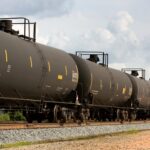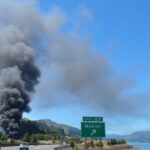Hundreds of thousands of gallons of oil have been spilled in the last three weeks.
BY JACOB PALMER | OB DIGITAL NEWS EDITOR
Oil trains started rolling through Oregon in late 2012 and a string of recent derailments have raised a new level of scrutiny about safety guidelines.
Hundreds of thousands of gallons of oil have been spilled in the last three weeks from four derailments on the eastern side of the continent.
Similar trains travel through Oregon — through the Columbia River Gorge, along the Deschutes River as well as the Willamette River — and OregonLive.com reports that planning for the mitigation of potentially disastrous derailment has been slow.
Portland Democratic Rep. Barbara Smith Warner recently proposed HB 3225, which “Directs Environmental Quality Commission to adopt rules applying certain oil spill prevention and emergency response planning requirements to railroads that own or operate high hazard train routes in this state.”
“They’re a reminder that this is a problem that continues to exist,” Smith Warner said to OregonLive.com’s Rob Davis. “The nine-month period of quiet was a fluke. This issue is not going away as long as we continue to produce and ship oil out of parts of the country that were never set up for it.”
From Davis’ story:
The bill would levy a one-time, $3.75 million assessment split among railroads moving oil through Oregon to pay for spill readiness as well as the supplies first responders need to address oil train accidents. A recurring $375,000 annual fee also would be split among those railroad companies to pay to continue oil spill planning along rail routes.
Smith Warner said the bill is modeled on similar legislation passed in Minnesota, which railroads there did not challenge in courts. She said she didn’t know whether rail companies would support the bill.
Nationally, legislators from recently affected areas are calling for stricter guidelines as well, NPR reports:
“Nationally, the rising number of fiery train derailments across the country is unacceptable. The Administration should act now to finalize their rule to strengthen tank car standards,” said Democratic Sen. Richard Durbin of Illinois in a statement.
“In the coming days, we need to look at not just the safety of the rail cars, but the safety of what is being put into those cars,” Durbin continues. “There is mounting evidence that stricter standards are needed in the handling of Bakken crude which appears to be particularly volatile. We can’t wait. The safety of our communities depends on it.”




